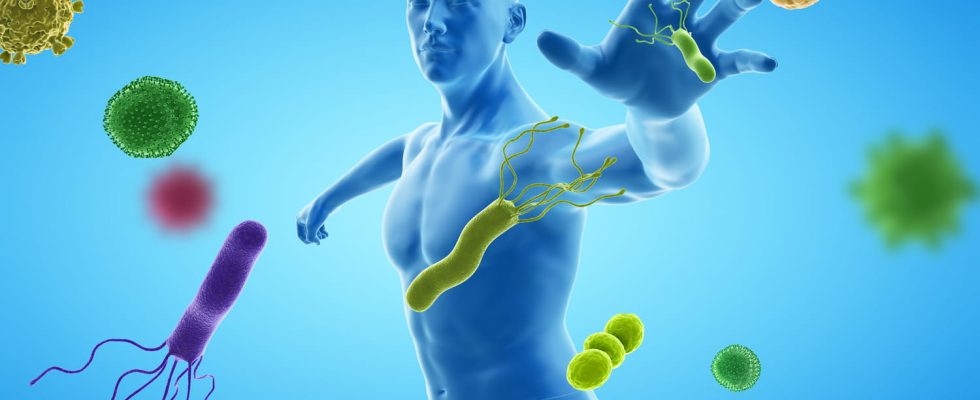Autoimmune diseases are pathologies linked to a dysfunction of the immune system. They cause an inflammatory reaction in the affected organ. What is the list of autoimmune diseases? Can we cure it?
An autoimmune disease refers to the fact that the immune system turns against the cells of its own body, creating an inflammatory reaction. Many diseases fall into this category. Thyroid, liver, skin, lungs, intestines, kidneys… many organs can be affected. What is an autoimmune disease? What can trigger it? List autoimmune diseases, symptoms, diagnosis and treatments.
Definition: what is an autoimmune disease?
A autoimmune disease is a pathology in which the immune system attacks its own constituents. “Normally, the immune system is educated to respect the cells of our body. During an autoimmune disease, it turns against them by considering them as foreign. This will create an inflammatory reaction“, explains Professor Zahir Amoura, head of the Internal Medicine department at Pitié-Salpêtrière, the national reference center for lupus and other systemic autoimmune diseases.
List of autoimmune diseases
Autoimmune diseases correspond to a dysfunction of the immune system, at the origin of at least 80 diseases. Among them :
Which organs are affected by an autoimmune disease?
All organs can be affected: skin, thyroid, liver, brain, lungs, eyes, kidneys, joints…”A distinction is made between autoimmune diseases confined to a single organ (the thyroid, for example, which is a frequent case), and autoimmune diseases systemic (or generalized) autoimmune, which will affect several organs (typically, systemic lupus, which affects the joints, skin and kidneys)“, specifies Professor Amoura.
What are the symptoms of autoimmune diseases?
Symptoms depend on the disease induced immune dysfunction. During the first phase of the disease, the immune system attacks the cells, there is a inflammation of the organ which is sometimes perceptible to the patient. In this case, the symptoms are related to inflammation of the affected organ:
- localized pain,
- redness,
- swelling….
Most of the time, the inflammation is not felt by the patient (quiet destruction of pancreatic cells producing insulin during type 1 diabetes, for example). “After a while, there is scarring of this inflammatory process. It is from there that the organ begins to malfunction and other symptoms appear: kidney failure for lupus, inability to secrete insulin for diabetes…“, explains the expert. These symptoms, more or less localized depending on the disease, can generate complications more global.
“It is often unknown why the immune system attacks the body in this way.“, explains Professor Amoura from the outset. However, certain risk factors have been identified:
► The genetic ground is predisposing: “a family tendency to produce inflammation will be associated with higher risk. When a 1st or 2nd degree relative (father, mother, brothers and sisters) has an autoimmune disease, we are at a little more risk.“.
► Women are more affected by these diseases than men – especially women of childbearing age. “sex hormones seem to play a role. The X chromosome, which the woman has in duplicate, would probably be linked to regulatory genes of the immune system which favor the appearance of these diseases“.
► Environmental factors are also involved: viruses, ultraviolet rays, certain drugs or even certain chemical agents. “They will initiate an abnormal immunological response and can generate longer-term immune dysfunctions“.
Lifelong treatment is sometimes necessary.
Which specialist to go to see for an autoimmune disease?
Treatment depends on the disease. If only one organ is affected, it should be consult the specialist of this organ. For example, for damage to the pancreas, the diabetologist is the appropriate doctor. A systemic autoimmune disease must be managed by an internistwhich will have a more global approach.
The diagnosis is made after a clinical examination and an interrogation, to highlight symptoms and detect pathology. “In general, it is the inflammation or the deficiency of an organ which puts on the track of an autoimmune disease“, specifies Professor Amoura. Additional examinations are also prescribed, depending on the pathology encountered. The common point is the possibility of finding, in a blood sample, disease-specific autoantibodies. For example :
- anti-thyroperoxidase in thyroiditis,
- anti-acetylcholine receptors in myasthenia gravis,
- anti-insulin antibodies in diabetes.
Can an autoimmune disease be cured?
Strictly speaking, there is no cure for an autoimmune disease, but the treatments can reduce or even eliminate the symptoms. However, sometimes it is necessary to undergo lifelong treatment.
There are several therapeutic strategies. The first is to administer medication in order to alleviate the dysfunction of the affected organ. “For example, insulin for diabetes, or thyroxin for thyroid pathologies“, illustrates Zahir Amoura. Another strategy aims to reduce inflammation and the activity of the immune system. “We then use corticosteroidsor even immunosuppressants” he adds. Finally, the new treatments open a way in terms of the management of autoimmune diseases, in particular systemic diseases. “JUntil now, treatments have been very compartmentalized – indicated for this or that disease only. Today thebiotherapies provide treatments that can be used for several autoimmune pathologies. Research is progressing and hopes are allowed.“
Thanks to Professor Zahir Amoura, head of the Internal Medicine 2, CRMR lupus, SAPL and other systemic autoimmune diseases department at Pitié Salpêtrière.
